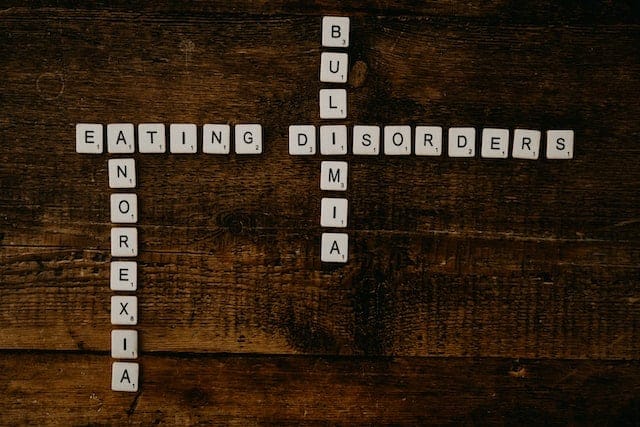








Anorexia, Bulimia, Or Binge Eating Disorder?
Over the course of my work as a psychotherapist I have come across people with anorexia, people with bulimia, people with binge eating disorder, and people with something else. Let me explain. Many of the clients I’ve worked with often describe a distorted body image and an intense fear of gaining weight. This of course impacts eating behaviour, such that they may experience a lack of interest in eating, a fear of it, or eat large amounts of food that they purge, and/or become preoccupied with fitness. All of this can consume life, meaning that sufferers aren’t able to have a social life, or feel at ease for any length of time.
The Nuances & Rejection of Diagnoses
Yes, aside from the struggles with food, some clients also struggle with their relationship with exercise, which can become just as obsessive as their relationship with food. So when we’ve discussed diagnoses, some clients have outright rejected the label of anorexia, bulimia or binge eating disorder, as classified by the diagnostic and statistical manual – the psychiatric bible for mental illnesses. This is because they feel their experience does not quite fit a single eating disorder, rather, it shares symptoms that are common across different disorders. And disordered eating is more common in boys and men than it was before. One of my clients called his doctor’s diagnosis of anorexia “stupid” because he didn’t believe he had “the same goals as anorexic people” because he wasn’t attempting to lose weight and be skinny, he was aiming for a toned and muscly physique.
When Sufferers Are Rejected By The Medical Model
On the other hand, there are people who believe they do have a particular eating disorder but do not receive a diagnosis. Take for example women who have bulimia; they binge and purge, and repeat this distressing cycle, and even experience biological effects like menstruation cessation. But, because they don’t have a body mass index (BMI) that warrants a diagnosis, they are not helped. Yes, astonishingly, even though they experience the symptoms of the condition and know they are bulimic, BMI is given precedence. This also means they don’t receive access to public health services and therefore, receive no support.
The Complexity & Power Of Diagnoses
Ultimately this suggests that diagnoses and disorders are not clear cut. Some individuals are diagnosed by health professionals with a particular eating disorder, and yet they don’t agree with the diagnosis. Whereas, others, who could be helped by access to public health services, do not receive a diagnosis because the criteria isn’t based on their self-report, and the effects it has on their actual bodies. It’s based instead on arbitrary index called BMI. This highlights problems with disorders and diagnoses, and implicates issues relating to power.
What Underpins All Eating Disorders
Nonetheless, one thing that all eating disorders have in common is that they are expressions of anxiety. This means that we’re all at risk of developing disordered eating, because we are all susceptible to anxiety. Take the aforementioned client. He craved a particular physique and therefore felt anxiety about gaining weight. This related to his experiences as a child, when he was obese, and he would often recall painful memories of that time. But when we looked closer, the anxiety was not about weight or body image itself, it was about unacceptance, rejection, and shame, emotions he was made to feel when he was obese. So although he couldn’t directly influence others’ response toward him, indirectly he could. That is, when he lost weight, he noticed a different, more accepting and positive response from his peers and even his family. So the pressure to keep their approval and acceptance created an anxiety so strong, he developed a disordered relationship with eating, exercise, and himself.
A Therapist's Responsibility
As therapists, it’s important to uphold the experiences of our clients, but it’s also important that we don’t become negligent and unhelpful when doing this. So we should not pay lip service, or collude with denial, if we believe denial is taking place. What we should do is attempt to understand why a particular person might conceptualise their relationship with food and fitness as somewhere in the grey area, and use this insight to facilitate their understanding, if perhaps they are being disingenuous. Conversely, understanding what it is that makes a client’s experience distinct is valuable information because only when we acknowledge their actual experience, rather than superimposing a disorder, can we be of use.
How Eating Disorders Can Impact Everyone Involved
One thing that clients with complex relationships with food or fitness have expressed to me is the frustration and hurt they feel because often, by the time they come my way, they want to recover. So when healthcare professionals disregard their experience, or if family and friends show a lack of understanding, or become angry, impatient, and critical, they add to the problem. But it has to be said, the situation is also frustrating to clients’ loved one(s), who feel helpless because they simply do not get it.
How To Help, No Matter What The Issue Might Be...
This is why it can be useful to include clients’ close family in their treatment, if all are open to this. Because if the client and his family can understand the underpinnings of the disordered eating, the psychological issues, and the nature of the anxiety, they are more likely to come from a place of true understanding, and thus be more equipped to care. As therapists it’s important to show care and understanding, to let our clients know that we are beside them, and that we know that they themselves are struggling. This is the only way we have a chance of helping them, whatever the issue might be.
- Why Is Suicide So Prevalent In KPOP? RIP Moon Bin
- PTSD: Case Study of Thomas Shelby
- Paedophilic Obsessive-Compulsive Disorder (POCD) I
- The Value Of Confronting Self-Doubt As A Psychotherapist
- What Happens When Trauma Is Ignored, Vs When It's Not
- A Warm Welcome From Phinity Therapy
- Rehanna Talks Issues
- Rehanna Discusses Phinity Services
- The HEALTHIER WAY To Grieve
- What Your THERAPIST'S TITLE REALLY MEANS!


